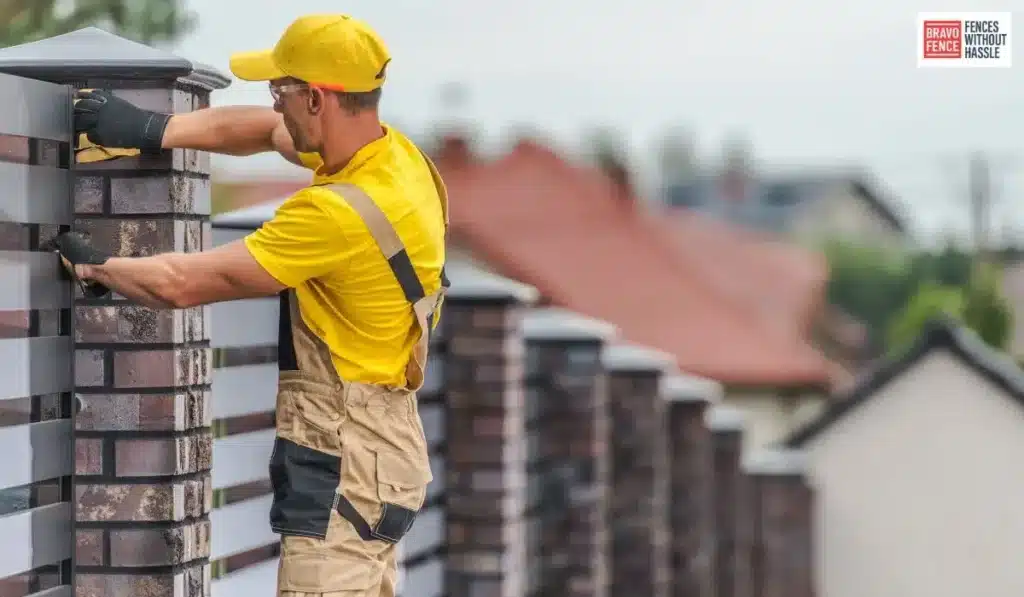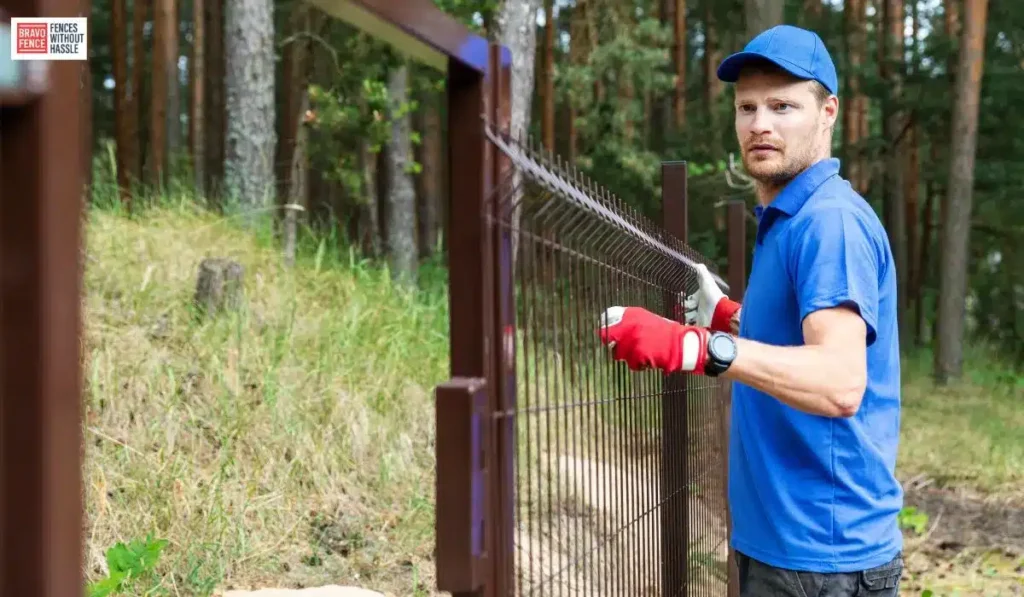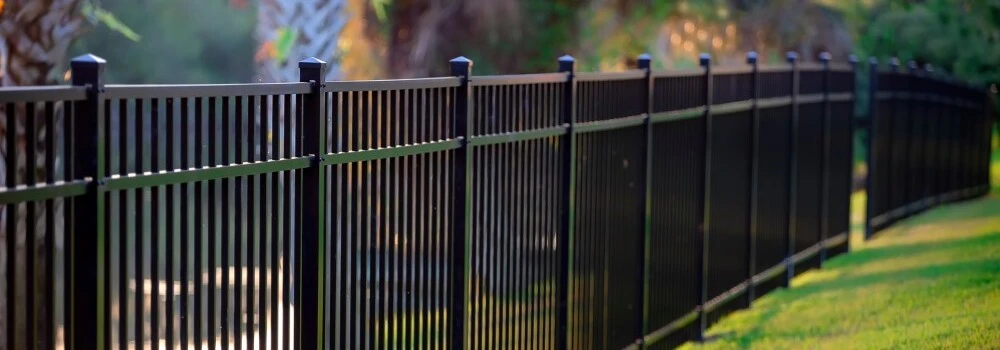
How Regular Fence Maintenance Ensures Durability and Beauty
Fences beautify your property, provide security, offer the privacy you need, and more.
However, one of the most common mistakes most homeowners make is forgetting that your fence needs maintenance until there’s a problem.
Like any structural part of your house, fences tend to be damaged or deteriorate unless looked after regularly.
In this comprehensive guide, we will discuss why it is essential to keep a wall, different types of maintenance, and different types of fences, as well as expert advice on how to keep your fence looking great for a long time.
Understanding Fence Maintenance
What Is Fence Maintenance?
Fence maintenance is doing several activities to keep a fence in good condition.
Some of these activities are as follows:
- Repairs: Repairing any damaged parts.
- Replacements: Replacing any worn-out parts.
The pattern and nature of this maintenance will be determined by the type of fence material, the prevailing environmental conditions, and the fence’s general design and purpose.
Why Do You Need to Maintain a Fence?
- Extends Lifespan: Regular maintenance can considerably increase the lifespan of your fence.
The earlier minor issues are attended to before they become more significant, the higher the chances you can forego expensive repairs or a complete replacement.
- It has security and safety: A broken or weak fence becomes risky, especially for kids and pets.
- It beautifies your property: A kept fence makes your building look better. An excellent wall increases the appearance of your property and can raise the house’s worth.
- Prevents Expensive Repairs: Damage may be created without regular maintenance, necessitating vast and expensive repair costs.
Upkeep allows for problems to be caught beforehand so they do not become worse.
- Helps Maintain Property Value: A functional and aesthetically appealing fence can significantly add to the value of your property, which helps attract more potential buyers.
Types of Fences and Their Upkeep Needs
- Wooden Fences
Among the most popular uses of wood, it presents natural beauty and versatility.
Wooden fences have been widely used; however, these need much maintenance to prevent rotting, warping, and damage from insects.
Tips for Maintenance
- Regular inspections: Check for signs of rotting, infestations, and loose boards.
- Clean the fence: Use a pressure washer or detergent and water at least annually.
- Protection: Coat the surface of vinyl fences with a waterproof stain or sealant every few years for protection against moisture and UV rays.
- Trims of Shrub and Plants: It can reduce the moisture that stays next to the fence walls by keeping shrubs and other plants cut close to the fences.
- Vinyl Fences
Vinyl fences are mostly low maintenance.
They resist the colonization of rot, rust, and pests, making them an excellent choice for homeowners.
Maintenance Tips
- Cleaning: Soap and water can be used to clean the surface. Pressure washers can also be applied in cleaning processes.
- Inspect Damage: Look for cracks or warping over periodic periods, especially after harsh weather.
- Metal Fences
Metal fences, such as aluminum and iron, hold well and are strong.
However, they can corrode fast.
Maintenance Tips
- Rust Treatment: Apply a rust-resistant primer and paint when necessary.
- Cleaning: Clean the surface regularly to remove dirt and debris, especially in coastal regions where salt accelerates corrosion.
- Check for Damage: Inspect for dents, rust spots, or loose fittings regularly.
Chain link fences are inexpensive and secure.
Even though these are less prone to maintenance than wooden fences, this does not mean that they do not require any form of maintenance at all.
Maintenance Tips
- Prevent Rusting: Check and paint if necessary for rust.
- Cleaning: Remove the soap and water algae from the dirt or debris collected on the fence.
- Inspect for Damage: Look for bent or broken links that might need to be replaced.
Common Fence Maintenance Tasks

Regular Inspections
It is through regular inspections that flaws are detected early.
Walk around your place and look for:
- Loose or Broken Boards: Check for any boards that are coming loose or broken.
- Rotting Wood: Inspect for any rotting wood, which is usually found at the bottom of wooden fences.
- Rust on Metal Fences: Look for any rusty spots or areas of corrosion.
- Pests: Check for bugs, including termite tunnels or droppings.
Cleaning Your Fence
You should clean your fence to maintain its beauty and prevent deterioration:
- For Wooden Fences: You can use a pressure washer or soapy water. Just mind the burning of the wood.
- For Vinyl Fences: Soap and water should be used in most cases. A low-pressure pressure washer will do the trick if the need arises.
- For Metal Fences: Keep the surface clean of grime and dirt by spraying rust inhibitors on the rusty places.
Prompt Repairs
One should address problems as soon as they arise to avoid further deterioration:
- Loose Boards: Tighten or replace loose boards immediately.
- Rotting Wood: Replace rotting sections with fresh wood.
- Rust on Metal: Sand down affected areas, apply a rust-inhibiting primer, and then repaint.
Protection Measures
Simple protective measures can make your fence last for a much longer time:
- Wooden Fences: Use a sealant or stain every few years to protect your wooden fences from moisture and UV exposure.
- Vinyl Fences: Treat with UV-resistant paints.
- Metal Fences: Paint over with a rust-resistant coating, as metals can rust.
Plant Control
Clearing your yard of heavy foliage plants will prevent moisture buildup and cause less destructive behavior:
- Shrubs and Plants: Don’t let vegetation encroach on the area within a foot of your fence.
- Weeds: Eliminate weeds and grasses growing at the base of your fence.
Cost of Ignoring Fence Maintenance
Significant Consequences of Neglecting Fence Maintenance
- Expensive Repairs: Small issues can mushroom into significant damages.
For instance, it can be that a tiny crack is the reason for rot, which might imply replacing a number of sections.
- Low Value: A neglected fence will sink your property’s curb appeal and, consequently, lower its value someday.
- Legal Issues: A broken fence may cause harm to others, and you might be held accountable if someone gets injured.
- Compromised Security: A broken fence will not be able to offer security and safety assurance to your property and, therefore, is more likely to attract intruders.
Financial Benefits of Maintenance
While spending money on the maintenance of a fence may seem just another unnecessary expense, you are saving money in the long run because:
- Preventive Main Repairs: Fixing minor issues immediately saves you from expensive repairs or replacements.
- Adds Value to Property: A properly maintained fence will eventually add value to the property, generating a more excellent sales value for buyers.
- Reduces Liabilities: A sturdy, well-maintained fence limits liability and associated lawsuits in case of accidents.
Professionals vs. DIY Fence Maintenance
When to Hire Professionals
But sometimes, homeowners should call in professionals to get the job done.
Those times are:
- Severe Damage: When the fence is structurally damaged, it’s best left to the professionals.
- Composite Materials: Fences from wrought iron or specialized materials may require professional maintenance.
- Time and Physically Challenged: Hiring a professional fence maintenance service will ensure the correct job is done if you don’t have the time or are not up to it physically.
How to Get a Fence Maintenance Company
If you have decided to hire a fence maintenance company, here is how to do it:
- Search for well-rated fence maintenance companies in your locality.
- Get Quotes: Get multiple quotes to compare prices and services.
- Ask for References: Check references or read online reviews to assess the credibility of the company and the quality of work.
Expert Advice on Fence Maintenance
- Schedule Maintenance: Plan a schedule for regular fence inspection and cleaning so that nothing slips through the cracks.
- Maintain a Record of Repair and Replacement: Monitor the maintenance activities, repairs, and replacements; this will be your record of how good or bad the fence has been.
- Be Proactive: One should be vigilant of changes in appearance or stability in the fence, and problems should be corrected as they arise.
- Educate Yourself: Know about the service requirements for the maintenance of your type of fence material so that you are given proper care.
- Upgrading: Once your fence has grown old and is always breaking down, you could upgrade to a more long-lasting type of material that requires less upkeep.
Conclusion
In short, the proper care of your fence will make sure that your home remains durable and beautiful over time.
Regular inspections, cleaning, prompt repairs, and protective measures can give your fence more years, make it look fantastic, and save money on future repairs.
However, some duties may require professional assistance when severe damage or complex materials are involved.
Through regular maintenance, you will enjoy the benefits of a solid and attractive fence that will enhance your property value and security.
FAQs
How Often Should I Maintain My Fence?
One should inspect their fence at least twice yearly, with its cleaning and protective treatments applied annually or biennially.
How do you know that your fence has to be repaired?
These would include loose or broken boards, evidence of rot or rust, cracks, and infestation by pests as signs to suggest that your fence requires attention.
Can you do it yourself or seek professional help?
While homeowners themselves can accomplish the great majority of maintenance tasks, there are times when significant damage or extremely complex material requires professional services.
How do I prevent moisture from getting into my wooden fence and causing it to rot?
I recommend staining or painting your wooden fence with weather-resistant products and keeping it clean of debris.
Which type of fence is the most minor maintenance?
Vinyl fences tend to be the most low-maintenance and resistant to rotting and pests. In addition, vinyl fences only need periodic cleaning.
What to do with an infestation of pests in my fence?
Eradicate pest infestations immediately by removing infested areas and spraying on applied pest control chemicals. It is best to seek advice from pest control professionals to kill severe infestations.
Tags: Complete Guide to Fence Longevity, Everything You Need to Know About Fence Maintenance, Explore Helpful Resources on Fence Appearance, Inspiration and Tips on Long Term Durability, Inspiration and Tips on Property Maintenance
